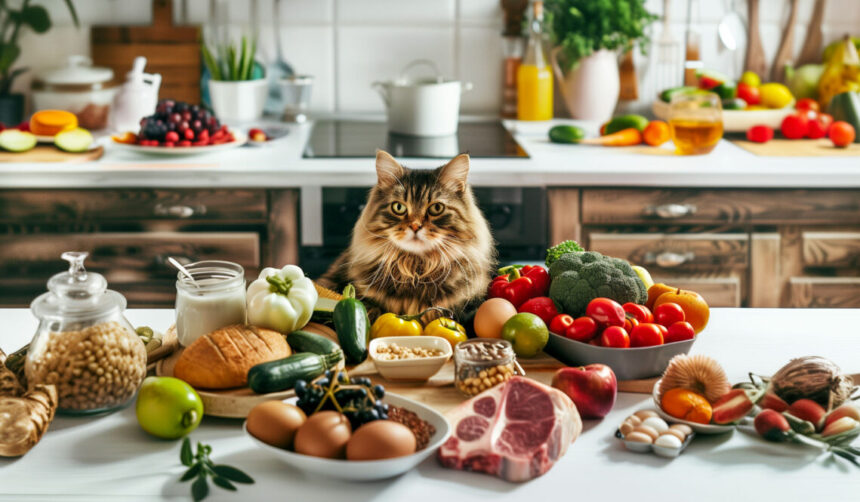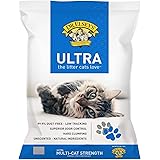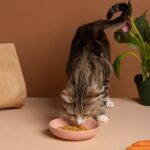Cats are curious by nature, especially when it comes to food. They might seem interested in what you’re eating, but not everything that’s safe for humans is safe for cats. Here, we’ll explore common human foods and whether they’re safe for your Cat.
Can Cats Eat Peanut Butter?
No, cats should avoid peanut butter.
While not toxic, peanut butter is high in fat, sugar, and salt, which can lead to obesity and other health issues in cats. Some peanut butter also contains xylitol, a sweetener that is highly toxic to cats. It’s best to keep this treat away from your cat.
Can Cats Eat Apples?
Yes, in moderation.
Cats can eat apples, but only in small amounts. The flesh of the apple is safe, but the seeds and core contain cyanogenic glycosides, which can be harmful. Always remove the seeds and core before offering your cat a small piece of apple.
Can Cats Eat Strawberries?
Yes, but sparingly.
Strawberries are non-toxic to cats. However, they should only be given in small quantities due to their sugar content. Too much sugar can cause digestive issues. If your cat enjoys the taste, a small bite occasionally is fine.
Can Cats Eat Pineapple?
Yes, but in small amounts.
Pineapple is safe for cats, but it should be given in moderation. Like strawberries, pineapple contains sugar, which isn’t ideal for cats. Make sure to remove the spiky skin and the hard core before offering a small piece to your cat.
Can Cats Eat Popcorn?
No, it’s not recommended.
While plain, unsalted popcorn isn’t toxic, it’s not a healthy treat for cats. Popcorn can pose a choking hazard, and the added butter, salt, or other flavorings are harmful to your cat’s health. It’s best to avoid sharing your popcorn with your cat.
Can Cats Eat Raw Chicken?
No, raw chicken is risky.
Feeding raw chicken to cats can expose them to harmful bacteria like Salmonella and E. coli, which can cause serious health problems. Cooked chicken is a safer option if you want to give your cat a protein treat.
Can Cats Eat Watermelon?
Yes, in small pieces.
Watermelon is safe for cats but should be offered in moderation. The flesh is hydrating and contains vitamins, but the seeds and rind can cause digestive upset. Always remove seeds and rind before giving your cat a small bite.
Can Cats Eat Raw Eggs?
No, raw eggs are dangerous.
Raw eggs can contain Salmonella or E. coli, which are harmful to cats. Additionally, raw egg whites contain avidin, a protein that can interfere with the absorption of biotin, leading to skin and coat problems. Cooked eggs are a better alternative.
Can Cats Eat Turkey?
Yes, but make sure it’s plain.
Turkey is a good source of protein for cats, but it should be cooked and served plain. Avoid giving your cat turkey that’s been seasoned or cooked with onions or garlic, as these are toxic to cats.
Can Cats Eat Raw Fish?
No, raw fish should be avoided.
Raw fish contains enzymes that can destroy thiamine, an essential B vitamin for cats. Thiamine deficiency can lead to neurological problems. Cooked fish is a safer option if your cat enjoys seafood.
Can Cats Eat Sweet Potatoes?
Yes, but only in moderation.
Sweet potatoes are non-toxic to cats and can be given as an occasional treat. They should be cooked and served plain. Avoid giving your cat sweet potato dishes that contain added sugar, butter, or spices.
Can Cats Eat Coconut?
Yes, but sparingly.
Coconut is safe for cats in small amounts. However, coconut oil and coconut flesh are high in fat, which can lead to weight gain and digestive issues. If you decide to give your cat coconut, do so in moderation.
Can Cats Eat Honey?
No, honey isn’t recommended.
Honey is not toxic, but it’s very high in sugar, which is not suitable for cats. Feeding honey can lead to obesity and other health problems. It’s best to avoid giving your cat honey.
Can Cats Eat Broccoli?
Yes, broccoli is safe.
Broccoli is a cat-friendly vegetable and can be given in small amounts. It’s full of vitamins and fiber. Some cats may even enjoy the taste. Make sure the broccoli is cooked and served plain to avoid any digestive upset.
Can Cats Eat Cheese?
Yes, but in moderation.
Cheese is not toxic, but many cats are lactose intolerant. If your cat can handle dairy, a small piece of cheese as a treat is fine. However, avoid giving large amounts or making it a regular part of their diet.
Can Cats Eat Oatmeal?
Yes, plain oatmeal is safe.
Oatmeal is safe for cats in small amounts and can provide some nutritional benefits. It should be plain, without any added sugars, spices, or dairy. Oatmeal can be a good occasional treat or mixed into your cat’s regular food.
Can Cats Eat Salmon?
Yes, but make sure it’s cooked.
Salmon is a good source of protein and omega-3 fatty acids, which are beneficial for cats. However, it should always be cooked to avoid the risk of parasites and bacteria. Avoid adding any seasonings or sauces.
Can Cats Eat Ham?
No, ham is not recommended.
Ham is often high in sodium and may contain preservatives that are not good for cats. While a small piece might not cause immediate harm, it’s not a healthy choice for your cat. Stick to plain, cooked meats like chicken or turkey.
Can Cats Eat Blueberries?
Yes, blueberries are safe.
Blueberries are non-toxic to cats and can be given as an occasional treat. They are low in calories and high in antioxidants, which can be beneficial. However, not all cats will enjoy the taste, so observe your cat’s preference.
Can Cats Eat Yogurt?
Yes, plain yogurt is okay.
Plain, unsweetened yogurt can be a safe treat for cats in small amounts. It contains probiotics, which can benefit digestive health. However, avoid flavored yogurts with added sugars or artificial sweeteners.
Can Cats Eat Cucumber?
Yes, cucumbers are safe.
Cucumber is a safe and hydrating snack for cats. It’s low in calories and can be given in small, bite-sized pieces. Make sure the cucumber is washed and peeled to remove any pesticides or wax.
Can Cats Eat Eggs?
Yes, but only cooked.
Cooked eggs are a good source of protein and can be fed to cats in moderation. Avoid adding any salt, butter, or seasonings. Scrambled, boiled, or poached eggs without any extras are a good option for your cat.
Can Cats Eat Grapes?
No, grapes are toxic.
Grapes and raisins are highly toxic to cats and can cause kidney failure. Even a small amount can be dangerous. Never offer grapes or raisins to your cat, and be cautious about foods that may contain them.
Can Cats Eat Bananas?
Yes, but only in small amounts.
Bananas are non-toxic to cats, but they should be given in moderation due to their high sugar content. A small slice now and then can be a safe treat, but don’t make it a regular part of their diet.
Can Cats Eat Bell Peppers?
Yes, in moderation.
Bell peppers are safe for cats, but they should be given in small amounts. They are low in calories and rich in vitamins. Make sure to remove the seeds and stem before offering a small piece to your cat.
Can Cats Eat Tomatoes?
No, especially raw.
Tomatoes contain solanine, which is toxic to cats. While ripe tomatoes have lower levels, it’s best to avoid feeding your cat tomatoes altogether, especially the stems, leaves, and unripe fruit.
Can Cats Eat Bacon?
No, bacon is not recommended.
Bacon is high in fat, salt, and preservatives, which are not suitable for cats. While a tiny piece might not cause harm, regularly feeding bacon can lead to obesity, pancreatitis, and other health issues.
Can Cats Eat Zucchini?
Yes, zucchini is safe.
Zucchini is a non-toxic vegetable for cats and can be given in small amounts. It’s low in calories and can be a healthy, hydrating treat. Make sure to cook or steam it lightly before offering it to your cat.
Can Cats Eat Asparagus?
Yes, but in moderation.
Asparagus is safe for cats, but it should be given in moderation. It’s high in fiber, which can be beneficial, but too much can cause digestive upset. Lightly cooked asparagus is best.
Can Cats Eat Beef?
Yes, plain beef is fine.
Beef is a good source of protein for cats, but it should be cooked and served plain. Avoid giving your cat beef that has been seasoned, especially with garlic or onions, which are toxic to cats.
Can Cats Eat Potatoes?
Yes, but only cooked.
Cooked potatoes are safe for cats, but raw potatoes contain solanine, which is toxic. Plain, boiled, or mashed potatoes without added butter or salt can be given as an occasional treat.
Can Cats Eat Squash?
Yes, squash is safe.
Squash is non-toxic and can be a healthy treat for cats. It’s rich in fiber and vitamins. Cooked squash, like pumpkin, can also help with digestive issues. Make sure it’s plain and without added sugars or spices.
Can Cats Eat Pumpkin?
Yes, pumpkin is beneficial.
Pumpkin is safe for cats and can help with digestive issues like constipation or diarrhea. It’s high in fiber and can be given in small amounts mixed with their regular food. Make sure it’s plain canned pumpkin, not pie filling.
Can Cats Eat Pistachios?
No, pistachios are not safe.
Pistachios are high in fat and can pose a choking hazard for cats. Additionally, the salt and seasoning often added to pistachios can be harmful. It’s best to avoid giving your cat pistachios.
Can Cats Eat Peanuts?
No, peanuts are not recommended.
Like pistachios, peanuts are high in fat and can cause digestive issues. They can also be a choking hazard. While not toxic, they’re not a healthy treat for your cat.
Can Cats Eat Kale?
Yes, but sparingly.
Kale is safe for cats in small amounts. It’s rich in vitamins and antioxidants, but too much kale can cause digestive upset. Offer a small, chopped piece occasionally, but don’t make it a regular part of their diet.
Can Cats Eat Basil?
Yes, basil is safe.
Basil is non-toxic and can be given to cats in small amounts. It’s not likely to be a favorite, but if your cat shows interest, a small piece won’t cause harm.
Can Cats Eat Oranges?
No, oranges are toxic.
Oranges and other citrus fruits are toxic to cats. They contain essential oils and psoralens that can cause gastrointestinal upset, depression, and even more severe symptoms. Keep oranges and other citrus fruits away from your cat.
Can Cats Eat Pickles?
No, pickles are not safe.
Pickles are high in salt and often contain seasonings that are harmful to cats. The vinegar used in pickling can also cause stomach upset. It’s best to avoid giving pickles to your cat.
Can Cats Eat Onions?
No, onions are highly toxic.
Onions, along with garlic, chives, and leeks, contain compounds that can cause anemia in cats. Even small amounts can be harmful. Never feed your cat onions or foods that contain onion powder.
Can Cats Eat Ginger?
Yes, in small amounts.
Ginger is safe for cats in small quantities. It can help with nausea and digestive issues. However, it should be given sparingly, as too much can cause stomach upset.
Can Cats Eat Nuts?
No, nuts should be avoided.
Nuts are high in fat and can pose a choking hazard. Some nuts, like macadamia nuts, are toxic to cats. It’s best to keep all nuts away from your cat.
Can Cats Eat Garlic?
No, garlic is highly toxic.
Garlic is more toxic to cats than onions and should never be fed to them. It can cause anemia and other serious health issues, even in small amounts.
Can Cats Eat Cabbage?
Yes, in moderation.
Cabbage is safe for cats in small amounts. It’s high in fiber and can be given cooked or raw. However, too much cabbage can cause gas and digestive upset, so it’s best to offer it sparingly.
Can Cats Eat Peas?
Yes, peas are safe.
Peas are a safe and nutritious treat for cats. They’re often found in commercial cat foods. You can offer your cat a few cooked or frozen peas as a healthy snack.
Can Cats Eat Avocado?
No, avocado is dangerous.
Avocado contains persin, which is toxic to cats. While cats are less sensitive to persin than some other animals, it’s still best to avoid feeding them avocado to prevent potential health issues.
Can Cats Eat Spinach?
Yes, but with caution.
Spinach is safe for most cats, but it should be given in moderation. Cats with urinary or kidney issues should avoid spinach due to its oxalate content, which can contribute to the formation of crystals in the urine.
Can Cats Eat Rice?
Yes, rice is safe in small amounts.
Cooked rice is non-toxic and can be given to cats in small amounts. It’s often used in bland diets to help with digestive issues. However, rice should not be a staple in their diet.
Can Cats Eat Grass?
Yes, and it’s normal behavior.
Cats often eat grass to help with digestion. It’s believed to help them expel hairballs or other indigestible materials. However, if your cat frequently vomits after eating grass, it’s best to consult your vet.
































































